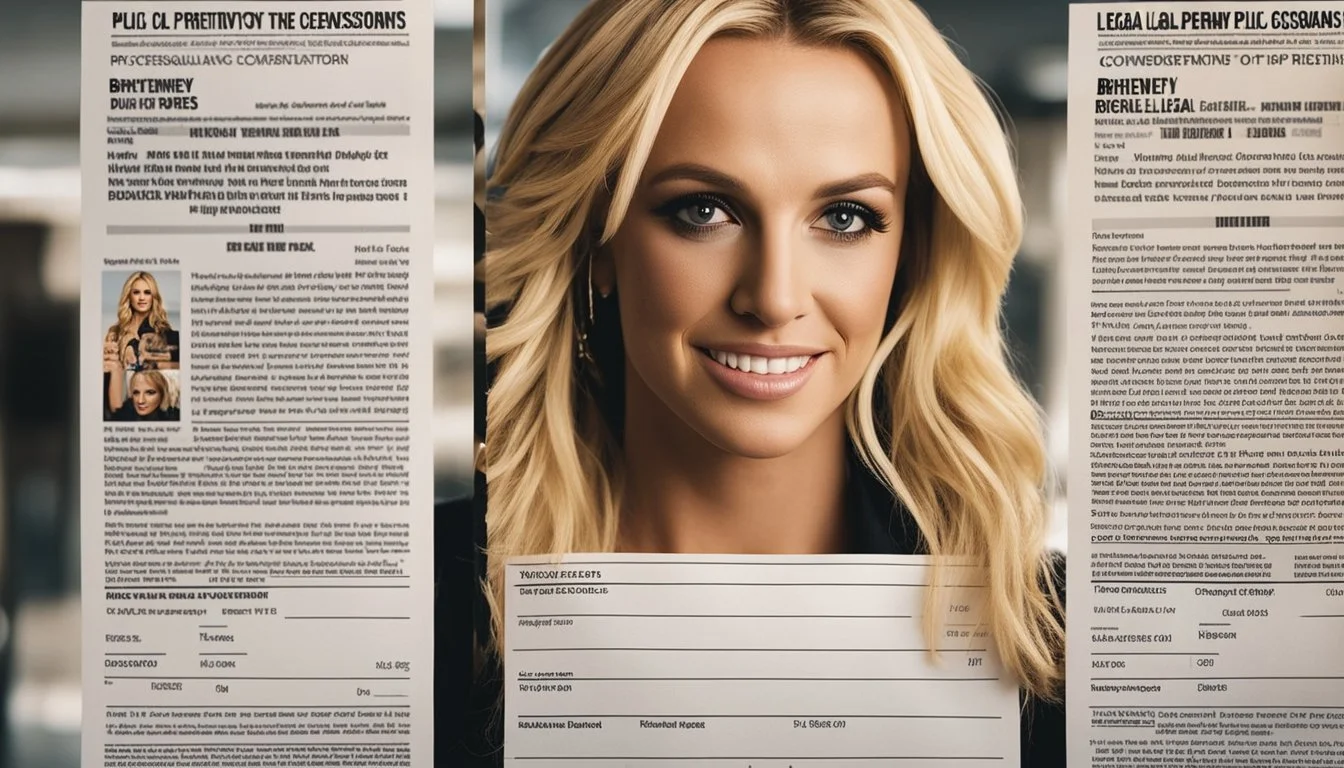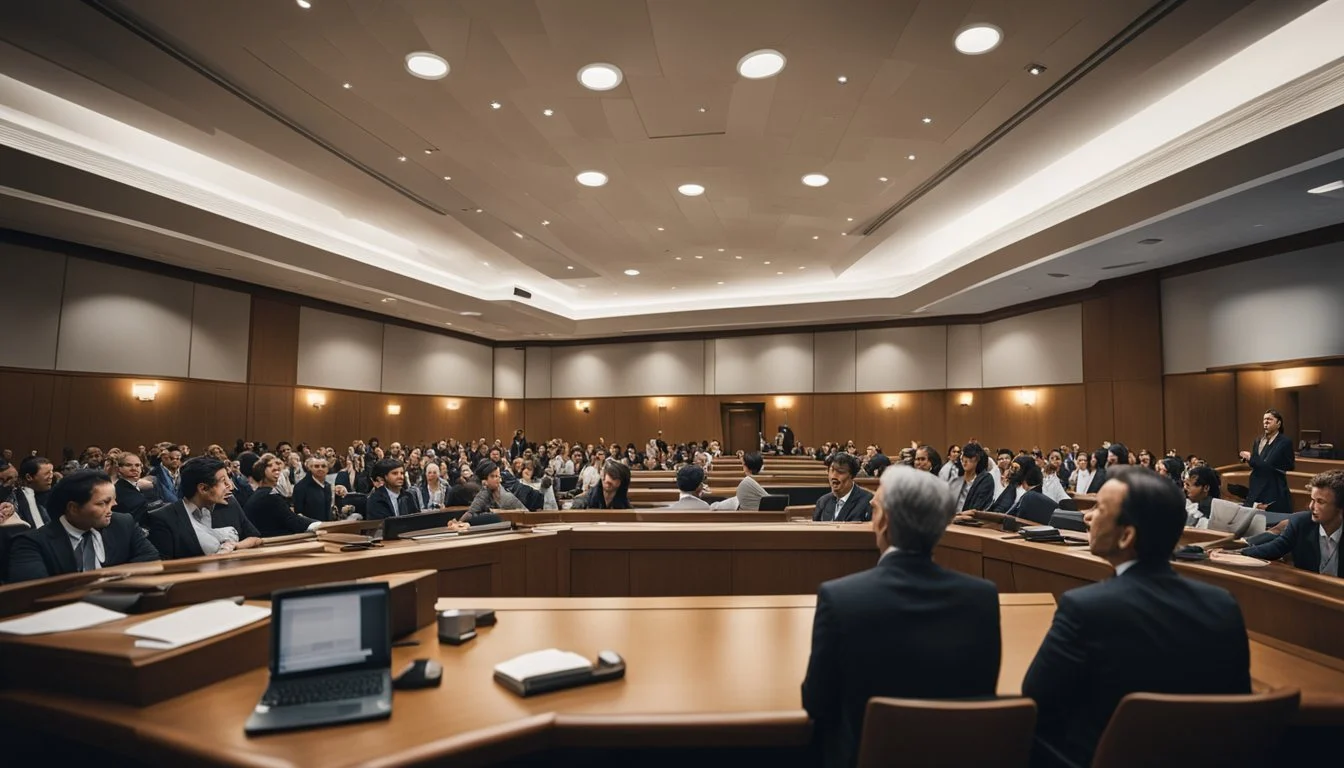Britney Spears Conservatorship Documentaries Raise Questions About Media Ethics and Public Interest
Britney Spears' conservatorship has captivated public attention, spawning multiple documentaries that aim to shed light on her complex legal situation. Major media outlets like Netflix, Hulu, and The New York Times have produced films examining various aspects of the pop star's life under conservatorship. These documentaries have sparked debates about their impact and intentions.
While the films claim to expose new details about Spears' circumstances, critics question whether they truly help her cause or simply exploit her story for viewership. Some argue the documentaries raise important awareness, while others contend they invade Spears' privacy and potentially harm her legal case. The filmmakers defend their work as journalistic efforts to uncover the truth.
The documentaries have undoubtedly influenced public opinion and galvanized Spears' fanbase to support the #FreeBritney movement. They've also faced scrutiny for their methods, accuracy, and potential effects on ongoing legal proceedings. As the conservatorship saga continues to unfold, these films remain at the center of discussions about media ethics, celebrity culture, and mental health.
The Rise of Britney Spears
Britney Spears rocketed to fame as a teenage pop sensation in the late 1990s, captivating audiences with her catchy music and energetic performances. Her journey to stardom was marked by relentless public attention and media scrutiny.
Path to Stardom
Britney Spears began her career as a child performer on "The Mickey Mouse Club" alongside future stars Justin Timberlake and Christina Aguilera. In 1998, at age 16, she released her debut single "...Baby One More Time," which became an instant global hit.
The accompanying music video, featuring Spears in a schoolgirl outfit, sparked controversy and catapulted her into the spotlight. Her debut album topped charts worldwide, selling over 25 million copies.
Spears quickly became a cultural icon, releasing hit after hit and dominating the pop music scene. Her dance-pop style and provocative image resonated with fans and defined a new era in popular music.
Public Scrutiny and Media Coverage
As Spears' fame grew, so did the intense media focus on her personal life. Paparazzi followed her every move, documenting her relationships, fashion choices, and daily activities.
The media's obsession with Spears reached fever pitch in the mid-2000s. Her high-profile relationships, including with Justin Timberlake and Kevin Federline, became tabloid fodder.
Spears' public struggles, including her 2007 head-shaving incident, were aggressively covered by the media. This relentless scrutiny played a significant role in shaping public perception of the pop star.
The intense media coverage and public attention ultimately contributed to Spears' personal challenges, leading to the establishment of her conservatorship in 2008.
The Conservatorship
Britney Spears' conservatorship was a complex legal arrangement that controlled various aspects of her life for over a decade. It sparked intense public debate and raised questions about personal autonomy, mental health, and the role of the legal system.
Beginnings and Legal Implications
The conservatorship began in 2008 following Spears' public struggles with mental health. A Los Angeles court placed her under the legal guardianship of her father, Jamie Spears, and attorney Andrew Wallet.
This arrangement gave them control over Spears' personal affairs and financial decisions. The conservatorship was initially temporary but became permanent later that year.
Under California law, a conservatorship is typically used for elderly individuals or those with severe disabilities who cannot care for themselves or manage their finances.
Jamie Spears' Role
As conservator, Jamie Spears held significant power over his daughter's life and career. He managed her $60 million estate and made decisions about her performances, business deals, and personal matters.
Jamie Spears stepped down as conservator of Britney's person in 2019 due to health reasons. Jodi Montgomery, a licensed conservator, took over this role.
In 2020, Britney's legal team began actively seeking to remove Jamie from the financial aspect of the conservatorship. This led to increased public scrutiny and support for the #FreeBritney movement.
Impact on Personal Life
The conservatorship significantly affected Britney's personal autonomy. She had limited control over her daily activities, relationships, and career choices.
Reports suggested she couldn't drive her own car, choose when to perform, or make major personal decisions without approval.
The arrangement also impacted her ability to manage her own finances. Despite earning millions from performances and business ventures, Britney had a court-approved allowance.
Mental health evaluations were a regular part of the conservatorship. These assessments played a crucial role in determining the ongoing necessity of the legal arrangement.
The Documentaries and Their Reception
Several documentaries have emerged exploring Britney Spears' conservatorship, shedding light on her struggles and sparking public debate. These films have garnered significant attention and varied responses from audiences and critics alike.
Framing Britney Spears
Released in February 2021, "Framing Britney Spears" was produced by The New York Times and aired on FX and Hulu. The documentary examined Spears' career, her treatment by the media, and the circumstances leading to her conservatorship.
It received widespread acclaim for its in-depth analysis and compassionate approach. Critics praised its ability to contextualize Spears' situation within broader societal issues.
The film sparked renewed interest in the #FreeBritney movement and prompted public discussions about mental health and celebrity culture.
Controlling Britney Spears
A follow-up to "Framing Britney Spears," this documentary aired in September 2021. It provided new insights into the conservatorship's inner workings and alleged surveillance of Spears.
The film featured interviews with former employees and associates, revealing previously unknown details about Spears' life under conservatorship.
It generated significant controversy and prompted legal responses from parties involved in Spears' conservatorship. The documentary's revelations contributed to increased scrutiny of the arrangement.
Britney vs Spears
Released on Netflix in September 2021, "Britney vs Spears" offered a different perspective on the conservatorship saga. Directed by Erin Lee Carr, the film delved into legal documents and featured interviews with key figures.
The documentary faced mixed reviews, with some praising its investigative approach and others criticizing its methods. It sparked debates about journalistic ethics and the line between exposition and exploitation.
Despite controversies, the film contributed to the ongoing public discourse surrounding Spears' situation and the broader implications of conservatorships.
Investigative Journalism and Exposé
Journalists and filmmakers played a crucial role in bringing Britney Spears' conservatorship to public attention through documentaries and investigative reports. Their work uncovered new information and shed light on the complexities of Spears' situation.
The Role of The New York Times
The New York Times spearheaded investigative efforts with its documentary "Framing Britney Spears." Directed by Samantha Stark and produced by Liz Day, the film examined Spears' career, public image, and conservatorship.
The documentary featured interviews with key figures and archival footage, providing context to Spears' legal situation. It raised questions about the necessity and ethics of the conservatorship, sparking public debate and renewed interest in the #FreeBritney movement.
The Times' reporting went beyond the documentary, with additional articles and follow-up investigations that kept the story in the public eye.
Investigative Reports and Interviews
Other journalists and filmmakers contributed to the growing body of work on Spears' conservatorship. Jenny Eliscu and Erin Lee Carr created "Britney vs Spears" for Netflix, which included exclusive interviews and confidential evidence.
Their documentary delved into the legal intricacies of the conservatorship and featured insights from individuals close to the case. It presented new allegations, including claims of surveillance in Spears' bedroom.
Investigative reports in publications like The New Yorker provided in-depth analysis of the conservatorship system and its impact on Spears' life. These reports often included interviews with legal experts, former associates, and individuals familiar with conservatorship practices.
#FreeBritney Movement and Public Support
The #FreeBritney movement galvanized fans and celebrities alike, drawing widespread attention to Britney Spears' conservatorship. Social media played a crucial role in amplifying the cause and garnering support from high-profile figures.
Origin and Growth
#FreeBritney began as a grassroots fan campaign in 2009, shortly after Spears' conservatorship was established. The movement gained significant momentum in 2019 when a fan podcast raised concerns about Spears' well-being.
Social media platforms like Twitter and Instagram became hotbeds for #FreeBritney activism. Fans analyzed Spears' social media posts for hidden messages and organized protests outside courthouses during conservatorship hearings.
The movement's visibility skyrocketed in 2020 and 2021, with increased media coverage and public scrutiny of Spears' legal situation.
Celebrity Endorsements and Fan Campaigns
Numerous celebrities voiced support for #FreeBritney, lending credibility to the movement. Miley Cyrus, Paris Hilton, and Cher were among the high-profile figures who publicly backed Spears.
Fan campaigns included:
Online petitions garnering millions of signatures
Virtual rallies and Twitter storms
Billboard advertisements in major cities
Celebrity support intensified after Spears' June 2021 court testimony. Mariah Carey, Justin Timberlake, and Christina Aguilera expressed solidarity with their fellow pop star.
The movement's impact extended beyond Spears' case, sparking broader discussions about conservatorship reform and disability rights.
The Inner Circle of Britney Spears
Britney Spears' personal and professional life has been shaped by a small group of close associates and family members. These individuals have played significant roles in her career, conservatorship, and public image over the years.
Confidants and Associates
Felicia Culotta, Spears' longtime friend and former assistant, has been a constant presence in the singer's life. Culotta worked with Spears from the early days of her career until 2007, providing emotional support and guidance.
Sam Lutfi briefly served as Spears' manager during her highly publicized struggles in 2007-2008. His involvement with the pop star was controversial, leading to legal disputes and a restraining order.
Adnan Ghalib, a paparazzo-turned-boyfriend, had a short-lived relationship with Spears in 2008. His presence during her difficult period raised concerns among her family and management team.
Family Members
Jamie Spears, Britney's father, became a central figure in her life as the co-conservator of her estate and person. His role has been scrutinized and criticized by fans and media alike.
Lynne Spears, Britney's mother, has maintained a complex relationship with her daughter. She has expressed support for Britney while also facing criticism for her perceived role in the conservatorship.
Jamie Lynn Spears, Britney's younger sister, has faced public backlash for her perceived silence during her sister's conservatorship battle. Their relationship has been strained in recent years.
Legal and Financial Control
The Britney Spears conservatorship granted extensive control over her personal affairs and finances to appointed individuals. This arrangement sparked debate about the balance between protection and autonomy.
Conservatorship Management
Jamie Spears, Britney's father, held primary control over the conservatorship for most of its duration. He oversaw both personal and financial aspects of Britney's life. The court appointed attorney Andrew M. Wallet as co-conservator for her estate.
Tri Star Sports and Entertainment Group managed Britney's business affairs during the conservatorship. This raised questions about potential conflicts of interest.
The conservatorship team made decisions on Britney's career, performances, and personal life. They controlled her spending and investments.
Monetary Gain and Interests
Financial records revealed significant payments to those involved in managing the conservatorship. Jamie Spears received a monthly salary and percentage of Britney's earnings.
Lawyers and business managers also profited from fees related to the arrangement. Critics argued these financial interests incentivized prolonging the conservatorship.
Britney's ex-husband Kevin Federline received child support payments throughout this period. The conservatorship ensured consistent payments despite Britney's fluctuating career.
Questions arose about whether decisions prioritized Britney's best interests or financial gain for others.
Surveillance and Privacy Concerns
The Britney Spears conservatorship case raised alarming questions about surveillance and invasion of privacy. Reports emerged of extensive monitoring of the pop star's communications and movements.
Allegations of Monitoring
Black Box Security, hired by Jamie Spears, allegedly conducted intrusive surveillance of Britney. The firm's former employee, Alex Vlasov, claimed they monitored her phone calls and text messages. He stated that an iPad mirroring Britney's iCloud account was used to track her activities.
Vlasov reported that audio recording devices were placed in Britney's bedroom. These devices allegedly captured private conversations, including those with her children and lawyer.
The security team also reportedly tracked Britney's movements using her cellphone. This allowed them to monitor her location at all times.
Testimonies and Evidence
Edan Yemini, CEO of Black Box Security, faced accusations of overseeing the surveillance operation. Robin Greenhill, an employee of Tri Star Sports & Entertainment Group, was also implicated in these activities.
Vlasov provided screenshots and recordings to support his claims. These materials suggested a pervasive monitoring system was in place.
The New York Times documentary "Controlling Britney Spears" brought these allegations to light. It featured interviews with individuals involved in the conservatorship.
These revelations sparked public outcry and legal scrutiny. They raised serious questions about the ethics and legality of such extensive surveillance.
Conclusion
The Britney Spears conservatorship documentaries sparked widespread public interest and debate. They shed light on the complex legal arrangement that controlled the pop star's life for over a decade.
These films played a crucial role in raising awareness about Spears' situation. They prompted fans and advocates to rally behind the #FreeBritney movement, pushing for an end to the conservatorship.
The documentaries also highlighted broader issues surrounding conservatorships and personal autonomy. They raised questions about the balance between protection and control in such legal arrangements.
Ultimately, the increased scrutiny contributed to significant changes in Spears' case. In 2021, she was granted the right to choose her own attorney, Mathew Rosengart.
This legal shift marked a turning point in Spears' fight for freedom. It paved the way for the eventual termination of her conservatorship in November 2021.
The impact of these documentaries extends beyond Spears' individual case. They have sparked discussions about reforming conservatorship laws and protecting vulnerable individuals' rights.
While debates continue about the ethics of such documentaries, their influence on Spears' journey to freedom is undeniable. They serve as a reminder of media's power to shape public opinion and effect real-world change.






